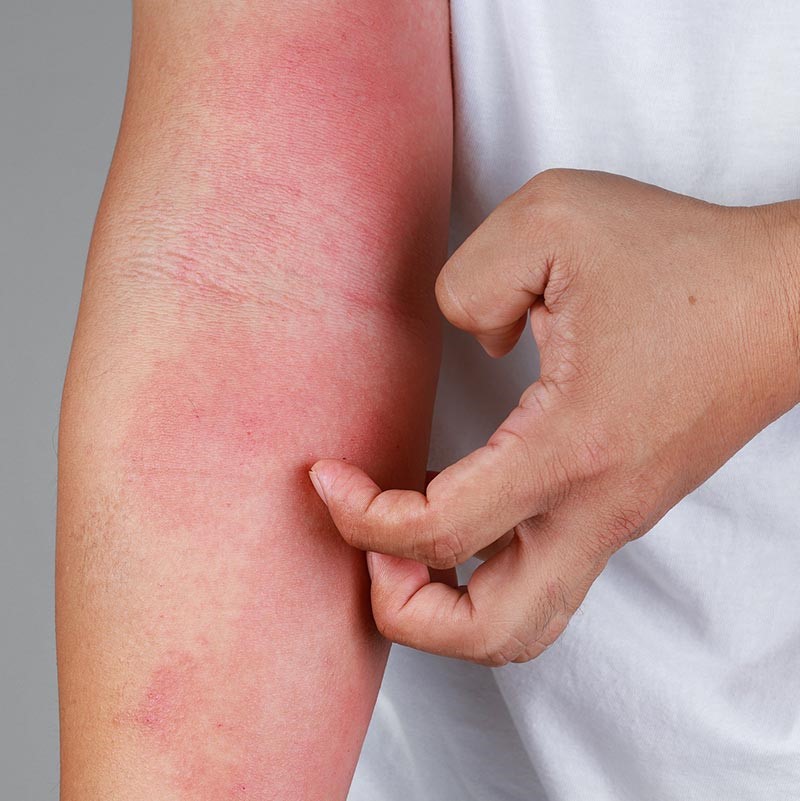Eczema
Eczema, also known as atopic dermatitis, is a chronic skin condition that affects millions worldwide. It is a non-contagious condition that causes the skin to become red, inflamed, and itchy.

What is Eczema?
Eczema is a non-contagious condition that causes the skin to become red, inflamed, and itchy. While the exact cause of eczema is unknown, it is believed to result from genetic, environmental, and immune system factors. People with eczema often have a family history of allergies, asthma, or hay fever.
Types of Eczema
There are several types of eczema, each with unique characteristics:
- Atopic Dermatitis: The most common form, often associated with other allergic conditions.
- Contact Dermatitis: Triggered by exposure to irritants or allergens.
- Dyshidrotic Eczema: Causes small, itchy blisters on the hands and feet.
- Nummular Eczema: Appears as round, coin-shaped spots on the skin.
- Seborrheic Dermatitis: Often affects oily areas like the scalp and face.
- Stasis Dermatitis: Occurs in the lower legs due to poor circulation.
Symptoms of Eczema
Common symptoms of eczema include:
- Intense itching, especially at night
- Red or brownish-gray patches of skin
- Dry, scaly, or cracked skin
- Swelling or thickened skin in chronic cases
- Small, raised bumps that may ooze and crust over if scratched
Common Triggers
Eczema flare-ups can be triggered by various factors, such as:
- Environmental Factors: Extreme temperatures, humidity, or pollution.
- Irritants: Harsh soaps, detergents, or certain fabrics.
- Allergens: Dust mites, pollen, or pet dander.
- Dietary Factors: Certain foods, such as eggs or dairy, can exacerbate symptoms in some individuals.
- Stress: Emotional stress can worsen eczema symptoms.

Diagnosis and Treatment
Diagnosing eczema involves a physical examination and a discussion of your medical history. In some cases, patch testing or skin biopsies may be necessary to identify specific allergens or rule out other conditions.
At St. Louis Dermatology & Cosmetic Surgery, we offer an approach to eczema treatment:
- Topical Treatments: Prescription creams or ointments to reduce inflammation and itching.
- Oral Medications: Antihistamines or systemic immunosuppressants for severe cases.
- Phototherapy: Controlled exposure to ultraviolet light to reduce symptoms.
- Lifestyle Modifications: Guidance on skin care routines and avoiding triggers.
- Moisturizers: Specially formulated creams to maintain hydration and barrier function.
Preventive Care
Preventing eczema flare-ups is a crucial part of managing the condition. Here are some tips:
- Moisturize Regularly: Apply fragrance-free moisturizers immediately after bathing.
- Avoid Harsh Soaps: Use gentle, hypoallergenic cleansers.
- Wear Comfortable Clothing: Opt for soft, breathable fabrics like cotton.
- Manage Stress: Practice relaxation techniques such as yoga or meditation.
- Stay Hydrated: Drink plenty of water and maintain a balanced diet.
Why Choose St. Louis Dermatology & Cosmetic Surgery?
At St. Louis Dermatology & Cosmetic Surgery, we combine medical expertise with personalized care to address your unique needs. Our team of board-certified dermatologists specializes in treating eczema with the latest advancements in dermatology. We strive to provide effective solutions that enhance your skin health and quality of life.
Contact St. Louis Dermatology & Cosmetic Surgery Today
Are you or a loved one struggling with eczema? The team at St. Louis Dermatology & Cosmetic Surgery is here to help.
Contact us today to schedule an appointment.
Let us partner with you on your journey to healthier, more comfortable skin. Reach out to us today—we look forward to hearing from you!
GET IN TOUCH

